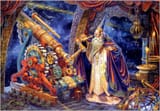Search Results
7/18/2025, 2:47:59 PM
>>24559545
While you need external phenomena to reinforce the “magic”, the same way the ancients looking to the night sky saw the stars as the gods, the external phenomena itself isn’t the “magic”. The chemistry in the brain leading up to that perception is. “Magic”. That’s the beauty of it. It’s in the world. It lies within the mind’s eye. Magic is love and appreciation for beauty and mystery. Wonder. It’s the recipe for it. It is what births religion. It is what drives us into the unknown. That sensation a biologist feels when they discover a new form of deep sea life? That’s magic. Even if they don’t use or interpret the word that way. Same as how miracles are magic by any other name. The bishops and priests saw the irony as an okay and accepted one. Even science today is indistinguishable from magic, wizardry, in areas. The wizardly trope or stereotype is built from ancient astrologer-priest and natural philosopher and hermetic alchemist (etc) aesthetics, which all led up to modern day science.
You don’t need much for magic. “I know something you don’t know!”. “I can do something you can’t do!”. The sage is the wizard and the wizard is the magician.
While you need external phenomena to reinforce the “magic”, the same way the ancients looking to the night sky saw the stars as the gods, the external phenomena itself isn’t the “magic”. The chemistry in the brain leading up to that perception is. “Magic”. That’s the beauty of it. It’s in the world. It lies within the mind’s eye. Magic is love and appreciation for beauty and mystery. Wonder. It’s the recipe for it. It is what births religion. It is what drives us into the unknown. That sensation a biologist feels when they discover a new form of deep sea life? That’s magic. Even if they don’t use or interpret the word that way. Same as how miracles are magic by any other name. The bishops and priests saw the irony as an okay and accepted one. Even science today is indistinguishable from magic, wizardry, in areas. The wizardly trope or stereotype is built from ancient astrologer-priest and natural philosopher and hermetic alchemist (etc) aesthetics, which all led up to modern day science.
You don’t need much for magic. “I know something you don’t know!”. “I can do something you can’t do!”. The sage is the wizard and the wizard is the magician.
7/10/2025, 7:01:57 PM
>>96052303
>Because science is definitionally empirical while magic operates on skeptical epistemology
Not necessarily. The wizard stereotype came from natural philosophers and proto scientists poking at the unknown and lacing their understanding with arcane know-how for the time. The idea that magic is distinct from science is one of ignorance. Science is the magic of the future. It stems from it. The learned men of the past were themselves priests, more often than not. The foremost “wizards” in Europe were monks of the Catholic Church, like Roger Bacon and Albertus Magnus, etc. Astrology and artifice and alchemy played big roles in the stereotype. Machines were seen as magic all the way in Ancient Greece. The word magic was broad, and its meaning expanded to include astronomy, astrology, alchemy, and other forms of esoteric knowledge.
>Because science is definitionally empirical while magic operates on skeptical epistemology
Not necessarily. The wizard stereotype came from natural philosophers and proto scientists poking at the unknown and lacing their understanding with arcane know-how for the time. The idea that magic is distinct from science is one of ignorance. Science is the magic of the future. It stems from it. The learned men of the past were themselves priests, more often than not. The foremost “wizards” in Europe were monks of the Catholic Church, like Roger Bacon and Albertus Magnus, etc. Astrology and artifice and alchemy played big roles in the stereotype. Machines were seen as magic all the way in Ancient Greece. The word magic was broad, and its meaning expanded to include astronomy, astrology, alchemy, and other forms of esoteric knowledge.
7/8/2025, 5:35:39 PM
Page 1

